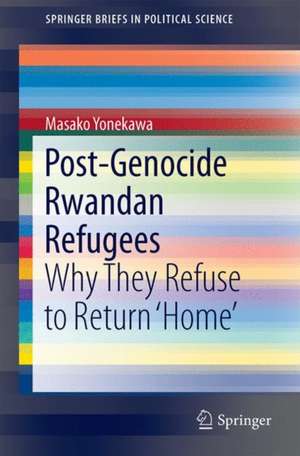Post-Genocide Rwandan Refugees: Why They Refuse to Return ‘Home’: Myths and Realities
Autor Masako Yonekawaen Limba Engleză Hardback – 18 dec 2019
“Forced migration is at the heart of the peacebuilding, conflict and insecurity challenges of the Great Lakes region of Africa. Refugee flows between the DRC and Rwanda have epitomized the human misery of contemporary armed conflict, in particular in the 1990s. Masako Yonekawa provides unique insights that are both politically compelling and deeply moving at the human level. It is written by someone with firsthand experience of the tragedy, and it effectively demonstrates that the humanitarian crisis of forced migration in the region was also a political crisis and a failure of international engagement. It is essential reading for anyone wishing to understand this difficult episode.”
Edward Newman, Professor, School of Politics and International Studies, University of Leeds
Preț: 403.69 lei
Preț vechi: 504.62 lei
-20% Nou
Puncte Express: 606
Preț estimativ în valută:
77.25€ • 84.17$ • 65.09£
77.25€ • 84.17$ • 65.09£
Carte tipărită la comandă
Livrare economică 21-26 aprilie
Preluare comenzi: 021 569.72.76
Specificații
ISBN-13: 9789811067556
ISBN-10: 9811067554
Pagini: 125
Ilustrații: XXXI, 156 p. 10 illus., 4 illus. in color.
Dimensiuni: 155 x 235 mm
Greutate: 0.45 kg
Ediția:1st ed. 2020
Editura: Springer Nature Singapore
Colecția Springer
Locul publicării:Singapore, Singapore
ISBN-10: 9811067554
Pagini: 125
Ilustrații: XXXI, 156 p. 10 illus., 4 illus. in color.
Dimensiuni: 155 x 235 mm
Greutate: 0.45 kg
Ediția:1st ed. 2020
Editura: Springer Nature Singapore
Colecția Springer
Locul publicării:Singapore, Singapore
Cuprins
1 Refugees’ Durable Solution: Voluntary Repatriation and Cessation of the Refugees’ Status.- 2 Process of “Armed Repatriation” of Old-Caseload Tutsi Refugees (1959–1994).- 3 New-Caseload Hutu Refugees’ Flight and Their Refusal to Return (1994–1997).- 4 Post-genocide Refugees’ Continued Refusal to Repatriate (1995–2017).- 5 US Responsibility in the Great Lakes Regional Power Dynamics and Rwandan Refugees.- 6 Conclusion.- Barbara's quote.- Author’s first letter to UNHCR.- References.
Notă biografică
Masako Yonekawa,Tsukuba Gakuin University
Textul de pe ultima copertă
This book highlights the repeated refusal of post-genocide Rwandan refugees to return ‘home’ and why even high-profile government officials continue to flee to this day. This resistance has taken place for a lengthy period in spite of the fact that genocide ended 25 years ago and the government of Rwanda and the United Nations have assured security in the country. Based on interviews conducted with a number of refugees living in Africa, Europe, and North America, the book explains the high degree of fear and trauma refugees have experienced in the face of the present Rwandan government that was involved in the genocide and other serious crimes both in Rwanda and the neighboring Democratic Republic of Congo. With this book, refugee policies and implementation of the United Nations and some host countries in Africa must be questioned. Some exiles have been stripped of their refugee status in early 2018 and host countries may refoul the refugees back to Rwanda, counter to theprinciple of non-refoulement (“no expulsion of refugees to a high-risk country”), the cornerstone of asylum and of international refugee law.
“Forced migration is at the heart of the peacebuilding, conflict and insecurity challenges of the Great Lakes region of Africa. Refugee flows between the DRC and Rwanda have epitomized the human misery of contemporary armed conflict, in particular in the 1990s. Masako Yonekawa provides unique insights that are both politically compelling and deeply moving at the human level. It is written by someone with firsthand experience of the tragedy, and it effectively demonstrates that the humanitarian crisis of forced migration in the region was also a political crisis and a failure of international engagement. It is essential reading for anyone wishing to understand this difficult episode.”
Edward Newman, Professor, School of Politics and International Studies, University of Leeds
“Forced migration is at the heart of the peacebuilding, conflict and insecurity challenges of the Great Lakes region of Africa. Refugee flows between the DRC and Rwanda have epitomized the human misery of contemporary armed conflict, in particular in the 1990s. Masako Yonekawa provides unique insights that are both politically compelling and deeply moving at the human level. It is written by someone with firsthand experience of the tragedy, and it effectively demonstrates that the humanitarian crisis of forced migration in the region was also a political crisis and a failure of international engagement. It is essential reading for anyone wishing to understand this difficult episode.”
Edward Newman, Professor, School of Politics and International Studies, University of Leeds
Caracteristici
Is the first book to systematically describe the present situation of Rwandan refugees on three continents Warns the international community of the high risk that UNHCR and some host governments in Africa are taking in expelling Rwandan refugees back to their ‘home’ country Highlights new testimonies of Rwandan refugees on what happened during their flight from Rwanda to the Congo following the 1994 Rwandan genocide and their lives in refugee camps
